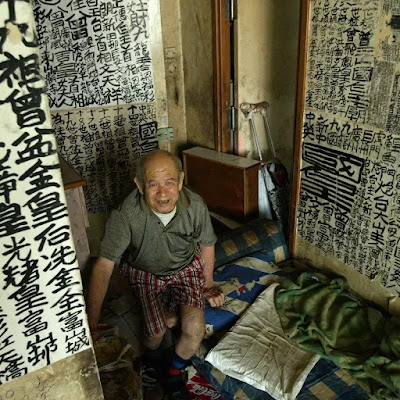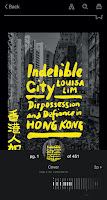I had to read Louisa Lim's 'Indelible City: Dispossession and Defiance in Hong Kong' (April 2022). But I couldn't read this book as though it's fiction. I had to take my time about it. I didn't finish it in one sitting either. It wouldn't do the book justice and it won't help me mull over the author's points of view.
Also, it's Hong Kong. I didn't grow up in Hong Kong and even if I think I understand the history and political shifts, and Beijing's National Security Law, I don't think I know enough of it, and especially not how its people truly feel about Beijing as the Overlord and Master. What if it's 50-50? Then what?
The book is divided into eight chapters and three parts — Part 1: Dominion, Part 2: Dispossession and Part 3: Defiance. Journalist and long-time Hong Konger who now lives in Melbourne, Australia, Louisa Lim couldn't be that honest about events and people in her book. In the Author's Note, she said,
This act of stripping away the identities of interviewees is all the more painful because my aim in writing this book was to place Hong Kongers front and center of their own narrative. Yet in this national security era, writing about Hong Kong's distinct identity is land-mined with risk. Indeed, many of Hong Kong's best writers can no longer find the words, or even the platforms to express themselves openly.
Most friends I know who live in Hong Kong either as citizens or long-term residents have left the city. They left as quickly as possible, in fear and disappointment. Luckily they did. The exit bans in August 2021 were madness. Apple Daily disappeared overnight. The political promises of 1997 have evaporated. The Hong Kongers themselves had no say over any of the negotiations between Chinese and the British governments. Neither do Hong Kongers have a say now.
The National Security Law is all-encompassing. It's amending textbooks and reeducating teachers, seeking to change the historical narrative of the former British colony, as well as 1989 Tiananmen incident. Even Cantonese is being eroded. Not when Beijing literally shuts down all dissent unceremoniously and as heavy-handed as she needs to be. Beijing's power is absolute. 香港能重光嗎?
Language is a key identity marker for Hong Kongers, who speak Cantonese rather than the standardized Mandarin—known as putonghua, or "common language"—introduced by China's Communist rulers in 1956. Though Cantonese is often viewed as a dialect, it's incomprehensible to Mandarin speakers. Some linguists see it as closer to classical Chinese than Mandarin, deploying archaic participles, ancient sounds, and traditional complex characters rather than the simplified ones used on the mainland. Unlike standardized Mandarin, Cantonese is gloriously irregular, its rules of pronunciation so causal that some words can be pronounced with either an initial n or l sound, used interchangeably. Cantonese didn't even get a romanization system until the 1950s, a full century after Mandarin was romanized by Thomas Wade. To this day, there's still no consensus about which of two romanization systems should be used or even how many tones Cantonese has; the range is five to eleven, depending on whom you ask.
I don't view the protests as a single-layered fight for democracy. That's too simplistic. It's a little bit more than that. The Hong Kongers have woken up and want a say, and even as Beijing literally rolls over them, they want a say. I'm not fond of the Communist rhetoric. I don't buy it and I don't accept it. Beijing can't seem to accept the Chinese diaspora doesn't all belong to her, and not all Chinese people are the same.
As a then-journalist on the frontline of the 2019-2020 protests, the author witnessed police brutality to all protesters and journalists. Journalists were beaten, harassed and detained. The author was routinely tear-gassed and pepper-sprayed. Elections and its results did nothing to quell the unrest. Beijing wouldn't back down. Hong Kong's own government leaders doubled down with even more force.
 |
| Protesting with Chinese calligraphy: 'The King of Kowloon' — Tsang Tsou-Choi (1921-2007). Who is this King? / Louisa Lim for The Guardian. 自稱「九龍皇帝」的曾灶財的街頭塗鴉無人不曉,他花了超過五十年的時間及心機,堅持在香港的大街小巷用毛筆書寫漢字,透過他獨特的文字宣傳自己主權,也被譽為「香港街頭塗鴉文化始祖」。 |
I've never seen so many friends flee Hong Kong the way refugees flee a war zone. People I know have been arrested, detained, released, and re-arrested. Even when one isn't in Hong Kong, the space for discussing about the events in Hong Kong have diminished. Threats against activists (in exile) and such are credible and plentiful.
The state of Hong Kong society and politics is something I know fairly well and I keep up with it, out of personal interest and for work related purposes. But it isn't a topic I'm keen to discuss with people at a social gathering. Not even if you're an academic. I don't have an objective viewpoint about it, and I'd like to stay within my echo chamber.
I was keen to know the author's thoughts about Hong Kong history, and the city she grew up in, and her experiences covering new shuttling between mainland China and Hong Kong. I was interested to know about her interview with the 28th and the last Governor of Hong Kong (1992-1997) Chris Patten, now Baron Patten of Barnes and Chancellor of Oxford University. The author doesn't mince her words in this book. You can be sure this book isn't going to be available anywhere in China. Even possessing a copy or be found to have read it could cause one to be prosecuted. The irony. In the Epilogue, she concluded,
Beijing's endgame was total dominance. Its actions sabotaged its own One Country, Two Systems formula, exposing it for the sham it was. In imposing the legislation, Beijing had in one fell swoop undermined the high degree of autonomy it had promised to Hong Kong, sidelined its judiciary and canceled its rule of law. It was as if, in order to fix a leaky pipe, the builders had pulled down the entire house and plowed up the land under its foundations.
 |
| Tsang Tsou-Choi (1921-2007) or in pinyin, Zeng Zaocai's works are now very rare, and a few have been protected by transparent boxes. / Anthony Kwan for The New York Times. |

No comments:
Post a Comment